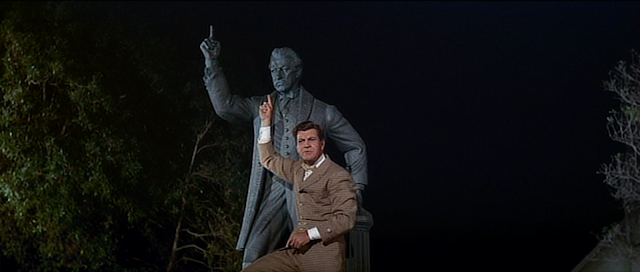I was recently reminded of The Music Man and remembered a number of realizations I'd previously had about Harold Hill's character.
It's clear from Hill's interactions with his friend Marcellus Washburn that the name Harold Hill is actually a pseudonym that he uses as a fraudulent salesman (Washburn calls him Gregory or just Greg a number of times). Significantly, the name Harold Hill alliterates. This quality illustrates his artifice and also draws attention to him, almost acting like a lure. The "Hill" part may even be meant to evoke a sort of beacon to which people are drawn.
Near the end of "Ya Got Trouble," Hill stands in front of a statue of Henry Madison, an important philanthropist for the town, and exhorts the crowd, "Remember, my friends: listen to me because I pass this way but once." When he says that he "pass[es] this way but once," he means it genuinely, unlike some of his other claims, but even this is twisted to his own advantage. By the time he leaves, the townspeople will know he's a fake, so he wouldn't dare return, but he casts his temporary presence in a positive light and advertises it as a valuable exclusivity instead.
At the end of his address, he winds up in nearly the same posture as the statue of Madison:
Here's a video from Turner Classic Movies of the full song:
It's a great visual gag, but it may also indicate an-other facet of Hill's savvy. Possibly, he's hoping that mirroring Madison's pose will transfer some of Madison's influence to him, making it easier for him to deceive the citizens of River City.
---&---
When I re-watched the movie earlier this week, I also noticed some specific elements that seem to attract Marian Paroo to Hill. In "Being in Love," Paroo describes her ideal man, and one characteristic is an interest in the classics, specifically Shakespeare and Beethoven: "And if occasionally he'd ponder / What makes Shakespeare and Beethoven great, / Him I could love till I die." While Hill is far from meeting her ideal in most respects, he does demonstrate at least a passing familiarity with both Shakespeare and Beethoven. In the candy kitchen, after Marian tells him, "I think it was wonderful of you sticking up for Tommy Djilas the way you did," he replies, "Well, a man can't go back on his principles merely because a little personal risk is involved. What does the poet say? 'A coward dies a thousand deaths; a brave man only five hundred.'" He seems to be referencing lines from Shakespeare's Julius Caesar: "Cowards die many times before their deaths; / The valiant never taste of death but once" (II.ii.32-33). Meanwhile, as per Hill's instructions, the band is practicing Beethoven's Minuet in G (WoO 10, No. 2) using his "think system." While Hill's interest in Shakespeare and Beethoven may not be quite as Paroo had envisioned, it does exist.
